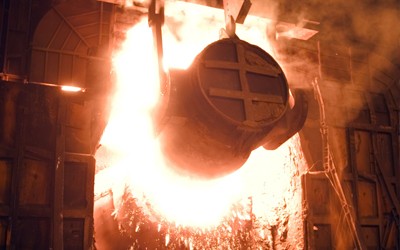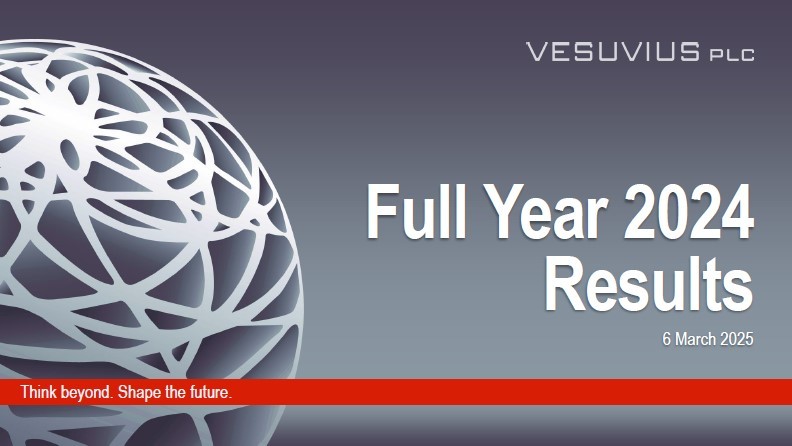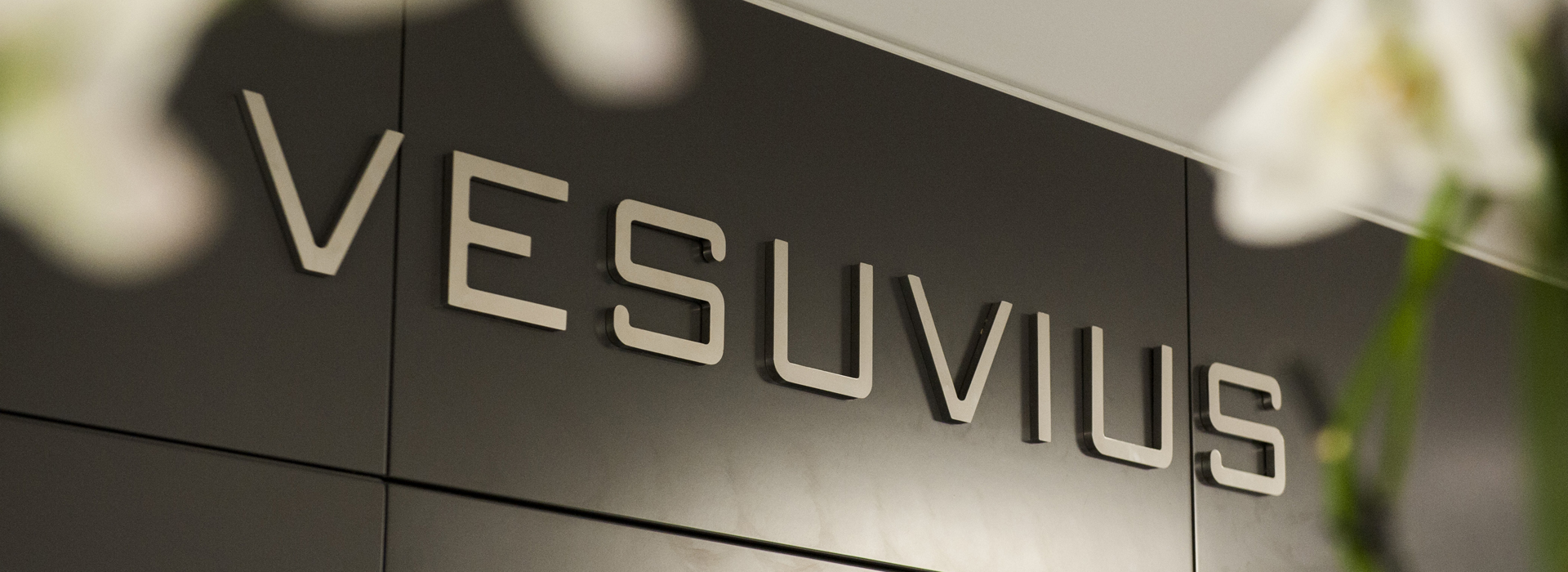Our business operations and organisaton structure
Vesuvius plc is a public limited company, listed on the London Stock Exchange, and a constituent of the FTSE 250 index. Vesuvius develops and manufactures high-technology products and solutions for supply to the steel and casting industries under the brand names Vesuvius and Foseco.
Vesuvius has a global presence with operations in 40 countries delivering cost competitive products and time efficient service. Vesuvius has 68 sales offices, 54 production sites and places industry experts at many customer locations. Vesuvius’ business is operated through 2 divisions – Steel and Foundry – with the Steel Division organised around three product lines – Steel Flow Control, Advanced Refractories and Digital Services. For more information on Vesuvius’ business please refer to our 2024 Annual Report.
Our commitment
Code of Conduct
The Vesuvius Code of Conduct sets out our commitment to international human rights standards, expressly prohibits forced or child labour in our operations and outlines the high-level standards of behaviour we expect from ourselves, our employees and across our supply chain. Our Code of Conduct is grounded in international human rights frameworks, including the UN Universal Declaration of Human Rights, International Labour Organization’s Fundamental Conventions, and UN Global Compact Principles.
The principles established in the Code are supported by our Human Rights Policy and Sustainable Procurement Policy.
Human Rights Policy
The Human Rights Policy reflects the principles contained within the UN Universal Declaration of Human Rights, the International Labour Organisation’s Fundamental Conventions on Labour Standards and the UN Global Compact, to which Vesuvius is a signatory. The Policy sets out the principles for our actions and behaviour in conducting our business and provides guidance to those working for us on how we approach human rights issues. Vesuvius commits not to discriminate in any of our employment practices and to offer equal opportunities to all. Vesuvius respects the principles of freedom of association and the effective recognition of the right to collective bargaining, and opposes the use of, and will not use, forced, compulsory or child labour. These principles have been integrated into the work of our procurement teams as we assess our suppliers and their business practices. The Policy was reviewed and updated in August 2022.
Sustainable Procurement Policy
Vesuvius extends its commitment to human rights and ethical business practices beyond our own operations, applying the same standards to our global supply chain. The Sustainable Procurement Policy applies to all suppliers of goods and/or services either used in our manufacturing processes and/or sold directly by us to customers, including tolling and resale suppliers. It applies to suppliers, their agents and their sub-contractors.
The Policy outlines key criteria for suppliers, including, among others, those related to the human rights standards:
- Zero tolerance for forced or child labour;
- Respect for freedom of association;
- Commitment to fair labour practices, equality and safe workplace;
- Prohibition of discriminatory employment practices.
These principles have been integrated into the work of our procurement teams as we assess our suppliers and their business practices. The Policy uses the Group Procurement’s ‘Request for Quotation’ (RFQ) process to engage a significant number of Vesuvius suppliers and is provided in conjunction with the Vesuvius Terms and Conditions of Purchase.
Risk assessment and management
Since the publication of our first transparency statement, we have conducted and periodically refreshed a risk assessment of our purchasing activities, seeking to identify, by location and industry, where the potential risks of modern slavery are highest.
Vesuvius commonly purchases products and services from industries with a recognised risk of modern slavery, such as mined and extracted materials, textiles (uniforms and personal protective equipment), transport, packaging, food preparation and maintenance.
As our spend with mining and extractive industry suppliers is far greater than the other three industries, and the number and diversity of suppliers is the greatest, we have been focusing our efforts on these industries. We have deepened our investigation of higher-risk raw materials, based on the studies carried out by Drive Sustainability and the Responsible Minerals Initiative on the responsible sourcing of materials in the automotive and electronics industries, with which our portfolio of raw materials shares many commonalities.
In 2024, 51% of our raw material spend was covered by this risk assessment. Four categories of raw materials were identified as presenting potentially higher risk: mica, graphite, bauxite and derived materials (aluminium, alumina), and platinum.
Our modern slavery risk assessment is reviewed regularly to update for business changes and input from across our business. As part of this review, we reconsider our assessment of the higher risk industries for Vesuvius. Our assessment remains consistent with the initial risk assessment performed eight years ago. During this time, we have conducted several risk assessments and reviews to identify any emerging risks related to modern slavery. As a result of growing concerns over forced labour, Group Procurement has increased its focus on looking for evidence of child and forced labour.
Supplier risk profile and due diligence process
Vesuvius conducts due diligence across our upstream and downstream value chain, with a strategic focus on managing potential risks associated with our business relationships. The Procurement team organisations in each Business Unit oversee the continuous assessment of risks and opportunities related to our suppliers. The process enables us to proactively prevent, mitigate and account for potential negative impacts on the environment and people throughout our value chain.
Supplier Sustainability Assessment
As part of our sustainability agenda, Vesuvius has implemented a Supplier Sustainability Assessment programme, covering all suppliers of goods either used in our manufacturing processes and/or sold directly by us to customers, including resale suppliers. Vesuvius has partnered with an independent third-party service provider – EcoVadis – to rate our raw materials suppliers using a detailed set of criteria. These cover four themes, and 21 criteria based on international standards: labour and human rights; ethics; environment; and sustainable procurement.
The supplier sustainability assessment methodology complies with international standards (e.g. ISO 26000, GRI, ILO, UN Global Compact). It includes the assessment of policies, measures, certifications and reporting, along with the endorsement of external CSR initiatives and principles.
Supplier assessments are carried out via a combination of questionnaires completed by suppliers, the collection of supporting documents and evidence, and the monitoring of a large number of sources (government agencies, compliance databases, sustainability networks, international organisations, NGOs, trade unions and specialised press).
Since its launch, 269 suppliers have joined the programme, representing 58% of the total raw material spend. Fewer than 8% of the suppliers assessed between 2021 and 2024 did not reach Vesuvius’ minimal EcoVadis score. We are requiring these suppliers to implement improvement actions within a three-year time frame. Progress will be monitored through routine evaluations and an annual reassessment. Across the crucial topics, the average total score of Vesuvius suppliers was 56.7, compared to an industry standard of 47.3.
Supplier Quality Audits
Additionally, Vesuvius conducts an annual Supplier Audit programme targeting our Corporate Social Responsibility (CSR) practices, product quality and security of supply. The programme is led by the Group’s purchasing and quality teams. The goal of the audits is to verify that our suppliers abide by fundamental principles regarding the environment and social practices, including human rights, and reduce the number of quality issues that may affect our raw materials and consequently our operations and those of our customers.
As part of this, we carry out on-site inspections, share expectations with our suppliers, identify risks and adapt our internal controls accordingly. We encourage our suppliers to improve their own processes and help them prioritise actions to achieve this.
These audits cover sustainability criteria, with particular emphasis placed, among others, on child and forced labour, and working conditions.
In 2024, 123 audits were conducted (100% on-site) (2023: 157). No cases of human rights breaches were detected as part of the supplier audit checks.
Training
In line with our modern slavery risk assessment, we provide webinar training to our key purchasing staff and we continue to use an online e-learning module to upgrade the training given to all supplier-facing staff. This provides key guidance on the red flags associated with modern slavery to assist them in identifying these during supplier visits and accreditation. Since the launch of the modern slavery red flag training, we have trained 100% of the targeted staff.
In addition to the above, in 2024, 141 employees from our procurement teams received specific training on supplier on-site sustainability and quality assessments (92% of the target group). The objective of this training is to educate the procurement community on the Sustainable Procurement Policy assessment requirements, including aspects related to the prevention of child labour, modern slavery and/or human trafficking.
Reporting concerns, monitoring and evaluation
Based on the geographic location of our manufacturing sites and our internal controls, we believe that no Vesuvius site is at significant risk of incidents of forced or compulsory labour. Vesuvius has implemented an internal audit system including Group Safety Audits, HR Sustainability surveys and a Speak Up whistleblowing process to systematically detect, manage and ensure the respect of human rights and labour rights across our operations. We continue to encourage our employees to remain vigilant to potential modern slavery and human trafficking abuses and escalate any concerns they may have with respect to these issues. Employees can report their concerns to management or through the independent ‘Speak up’ helpline, where reports are reviewed and investigated independently. As with all incident reporting, individuals who raise concerns on modern slavery in good faith will never be the target of retaliation. In 2024, no cases of modern slavery or human trafficking abuses were reported via our whistleblowing channels.
In 2024, 15% of Vesuvius’ operational sites – 19 sites in total – were assessed for human rights impact risks, and no breaches were identified. One of these inspections was external.
Similarly, child labour and forced labour were included in the Group Safety Audit scope in 2024. These inspections are carried out on site. In 2024, 63 audits were carried out (2023:67), with no breaches identified. These included 50 manufacturing and R&D sites and 13 customer locations.
These audits, along with the feedback from the Speak Up whistleblowing process, inform the Group of potential human rights risks within its operations.
UK entities
This statement and the actions taken apply to Vesuvius plc and its subsidiaries, the specific UK entities that meet the reporting threshold are noted below;
- Vesuvius plc
- Vesuvius UK Limited
This statement was reviewed and approved by the Boards of Directors of Vesuvius plc and Vesuvius UK Limited on 15 May 2025 and signed on their behalf by:
Carl-Peter Forster, Chairman Henry Knowles, Director
Vesuvius plc Vesuvius UK Limited







